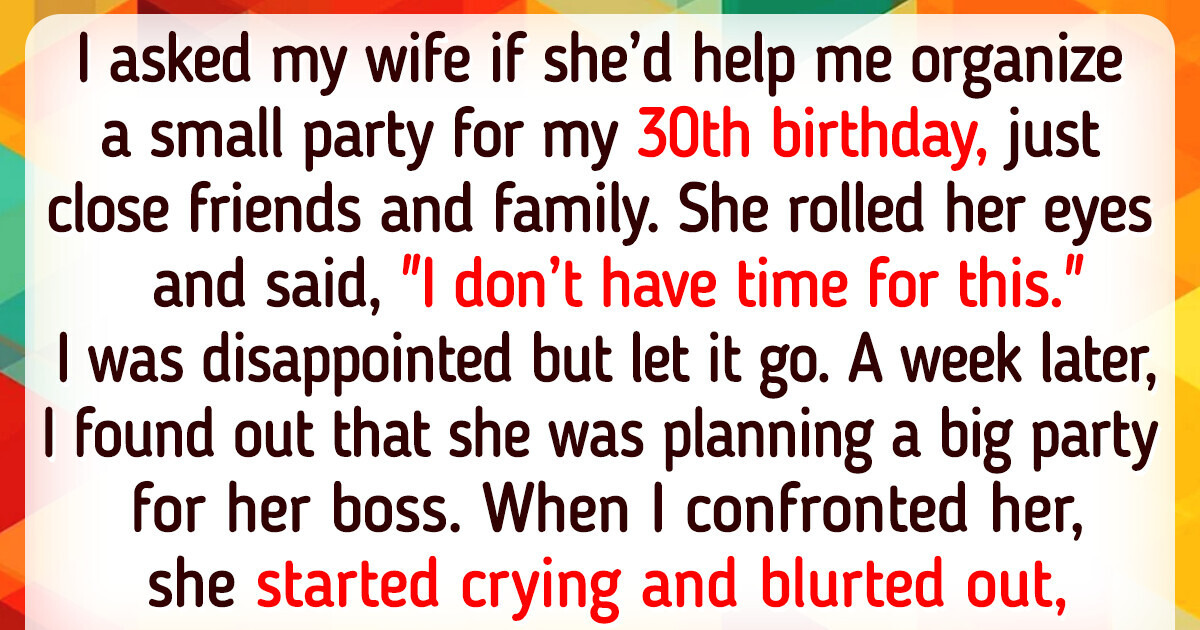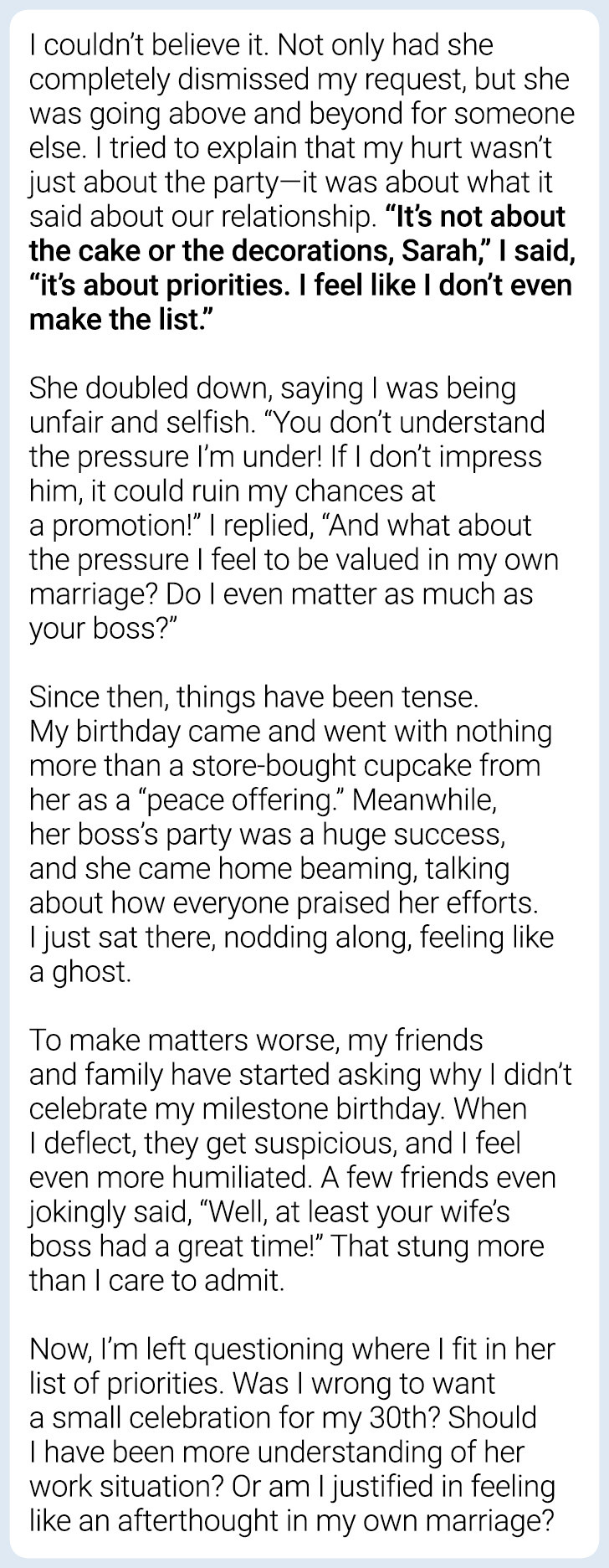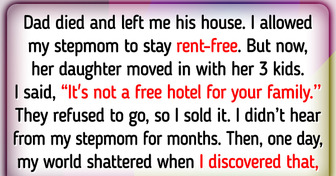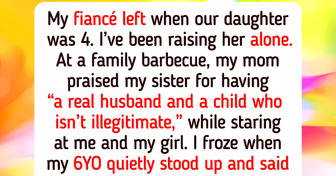You are still very young, and have years ahead of you. Time to jump ship. Get a divorce. If it's not her boss, it would be her little dog, or her BFFs. Half the world is female.
My Wife Refused to Host a Birthday Party for Me, I Feel Humiliated

Joe, a 30-year-old man, writes to us seeking perspective after his wife, Sarah, dismissed his request for help organizing a small birthday celebration, only to later discover she had been planning a lavish party for her boss. Hurt and feeling overlooked, Joe is questioning whether he’s overreacting or if his feelings of neglect are justified. His story highlights a common struggle in relationships: balancing personal needs with professional pressures. Let’s explore his situation and the emotions at play.


Joe, your letter highlights a situation that many couples can relate to—one where personal needs collide with work pressures, and the emotional fallout leaves one partner feeling unimportant and hurt. Birthdays are milestones, and for most people, they’re about much more than just cake and presents; they’re about being seen, being valued, and feeling loved. Your disappointment over your wife’s reaction isn’t just about a party—it’s about emotional neglect and, perhaps, a misalignment of priorities in your marriage. We hear you, and we think it’s important to unpack both sides of this situation to get to the root of your feelings.
The emotional disconnect
Joe, it’s clear that your request for a birthday celebration wasn’t just about wanting a party—it was about wanting to feel valued and seen in your marriage. Birthdays are a time when people want to feel special, to be celebrated, and to know that they matter to the people closest to them. So when Sarah dismissed your request so quickly and with such disdain, it understandably left you feeling hurt. It’s not just about the party, but about the fact that your emotional needs were ignored, and in your mind, this wasn’t just a one-time incident. It can feel like a rejection when someone you love refuses to support something that would mean so much to you.
It’s also possible that Sarah doesn’t fully understand the depth of your feelings. Communication in relationships is key, and often, what one person sees as a simple request, the other may perceive as a demand or an inconvenience. You asked her for help, but she seemed to interpret it as a burden, maybe even a reminder of her busy life. While this doesn’t excuse her behavior, it’s important to acknowledge that her frustration may have been more about her stress than a lack of love for you.
Understanding Sarah's pressures
However, it’s also crucial to understand Sarah’s perspective. You mention that she’s working under significant pressure at her job, and it sounds like she was juggling an important opportunity with the party for her boss. The fact that she was planning such a lavish event, hoping it would secure a promotion, points to the high stakes involved. Work-related stress is a real thing, and the demands of climbing the corporate ladder can sometimes overshadow personal commitments, even to the people we love most.
When she cried and said she feared for her career, it shows that this wasn’t about ignoring you—it was about survival in her professional life. She may have felt like she needed to go above and beyond to prove her worth at work, especially if a lot was riding on her performance. But here's the thing: emotional neglect in a marriage can’t always be justified by career ambition. While her job may have required her attention, the lack of balance is what seems to have hurt you the most.
Is your reaction justified?
You are justified in feeling hurt and overlooked. Relationships thrive on mutual care and respect, and when one partner’s needs are consistently sidelined, it’s natural to feel like an afterthought. Your feelings are valid, and it’s okay to want to be a priority, especially on a significant occasion like your 30th birthday. We all want to feel like we matter—not just as a partner, but as a person deserving of attention and celebration.
However, the key question here isn’t whether your feelings are justified—it’s about how you can communicate those feelings to Sarah in a way that fosters understanding and healing. If the two of you continue to be stuck in a cycle of frustration and defensiveness, it will be harder to move past this. The goal should be to find a way to talk through this without turning it into a blame game. That requires patience, empathy, and an openness to hearing each other’s struggles, both personal and professional.
What this says about your relationship
Your situation points to a deeper issue in your relationship: a lack of balance. It’s clear that Sarah is focused on her career, and while that’s admirable, it seems like she’s not giving enough attention to the emotional needs of her marriage. On the flip side, your emotional needs seem to be pushed aside for work priorities, and this creates a dangerous imbalance.
Healthy relationships require give-and-take, and when one partner feels consistently overlooked, it can lead to resentment. You’re not asking for grand gestures or lavish celebrations—you simply want to feel valued and loved. This, in itself, isn’t an unreasonable request, and it reflects a fundamental need for connection and mutual respect in your relationship.
What can be done moving forward?
We don’t want to oversimplify your situation, but here’s what we think could help moving forward: open, honest, and empathetic communication. Instead of blaming Sarah for not planning the party, try explaining to her how her actions (or lack thereof) made you feel. Let her know that it wasn’t just about the party, but about being a priority in her life. Express how her dismissiveness hurt you, and give her a chance to share her side of the story without judgment.
It might also help to discuss balancing professional pressures with personal relationships. Perhaps Sarah doesn’t realize how her work is bleeding into your shared life, and a conversation about boundaries could go a long way in restoring some balance. The truth is, careers are important, but so are marriages—and no one should feel like they’re competing for attention.
Finding a path to healing
Joe, we understand your frustration. Feeling overlooked, especially by someone you love, is painful. But this moment could serve as a turning point in your marriage. It’s not about a birthday party; it’s about being seen, heard, and supported in a way that feels fair and mutual. Both of you deserve to feel valued—in your career and your relationship.
Ultimately, it’s up to you and Sarah to decide how to move forward from this situation. We hope you can find a way to reconnect, understand each other’s needs, and rebuild the emotional closeness that seems to have been lost. By facing this issue head-on and working through it together, you might come out stronger on the other side, with a relationship that truly honors both of your priorities.
Like Joe’s situation, another reader's story also highlights how small conflicts can grow into larger issues in relationships. When her husband wasn’t ready on time for her 40th birthday dinner, Mariana decided to leave without him, causing tension in their family. Was she right to do so? To read her side of the story and explore how these challenges affect relationships, check out the full article here.
Comments
Related Reads
12 Stories Where One Plot Twist Changes Everything

I Threw My Stepmom Out of My Dad’s House — It’s Not a Free Hotel

15+ Stories About Teachers Who Gained Students’ Respect With Just One Deed

12 People Shared Their Elevator Stories, and You Won’t Forget Them Even If You Get Amnesia

8 Body Language Tips That Can Make You Seem More Self-Confident

13 Women Who Prove Living Razor-Free Is Absolutely Amazing

I Was Shamed for Being a Single Mom — but My Little Girl, 6, Had the Last Word

11 True Stories That Prove Real Life Doesn’t Need a Screenplay

I Refuse to Obey My Pregnant DIL’s Demand to Turn a Merry Christmas Into a Vegan One

20+ Moments That Remind Us That Kindness Costs Nothing but Means Everything

My DIL Excluded Me From Our Family Trip Photos—But She Didn’t Expect My Revenge

12 Times Kindness Appeared When Life Hit Rock Bottom







